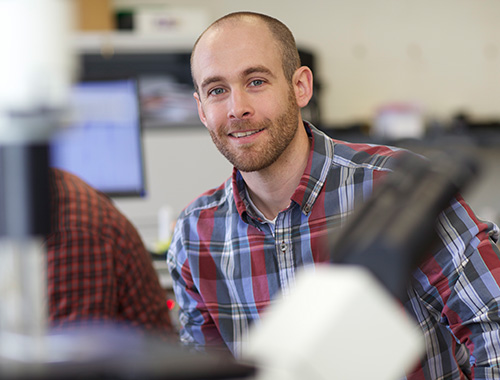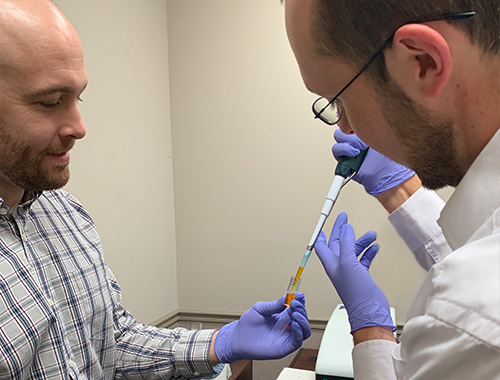
Assistant Professor Andy Sarles Breathes Life Into Innovation
Most people don’t walk around thinking about their bodies as a marvel of engineering. Then again, most people don’t know nearly as much about the properties of cells and their applications for engineering as Assistant Professor of Mechanical, Aerospace, and Biomedical Engineering Andy Sarles.
Andy specializes in the study of biological materials for engineered purposes. In other words, he seeks to make use of molecules or the properties of molecules found in all living cells for engineering or scientific applications. Focused on lipids and proteins, two categories of these cellular molecules, his research has implications across a wide range of disciplines, like safer and more effective cancer treatments or more efficient, adaptive computer processing modeled after the human brain.

The latter brain-inspired computer processing is one of Andy’s favorite current research projects. Called neuromorphic engineering, the traditional approach seeks to modify silicon chips and wafers to mimic behaviors of neurons and synapses in the brain, making computers and information processing more efficient. Andy is flipping the script with his research and taking a look at the problem from the other side. “The brain is the most efficient computer on the planet. It doesn’t operate on a battery; it operates continuously with soft materials at room temperature without overheating,” he explained. “What other soft materials might provide functionalities you don’t get with silicon?” This research has the potential to transform information processing and robotics, in particular. The soft materials inspired by brain cells could enable a preflex or adaptive reflex response in robots, allowing them to process stimuli with little forethought.
Andy is also currently studying the transport of living particles and synthetic nanomaterials through the cell membrane. Though he emphasizes that his work is not biomedical – he doesn’t “think in terms of treating disease or medical issues” – his research has great implications in that arena as well. Drug delivery can be made more effective, efficient, and safer if materials can enter the cellular membrane harmlessly. This research led Andy and one of his PhD students to invent new technology to assemble and use model cell membranes. The new assemblies enable artificial membranes to demonstrate neuromorphic (biological) behaviors. With assistance from UTRF, this invention is currently patent pending.

“UTRF provides a vital pipeline to protect ideas, which can lead to full patents or marketing guidance,” Andy said. UTRF previously assisted Andy in securing a patent on an interdisciplinary project studying the interaction of bacteria with plant roots. A UT professor needed a way to perform microscopy on these interactions, so Andy partnered with Oak Ridge National Lab to develop a transparent cartridge in which a seed can grow. Once roots grow and are infused with a bacteria culture, the transparent cartridge can be flipped over and viewed under a microscope. He’s also submitted invention disclosures for a number of other technologies. One includes membrane-based memristors and memcapacitors – which unlike resistors and capacitors, will change their properties based on past experiences like applied voltage. Another, with his former student Graham Taylor, entails developing new measurement techniques to study the properties of cell membranes.
“Andy brings experience across many disciplines and a collaborative approach to his research,” comments UTRF Licensing Associate Andreana Leskovjan, “qualities that make him not only a great mentor for his students, but an important innovation partner for UTRF.”
Even as a child growing up in a small town in West Virginia, Andy was drawn to science, math, and physics. He continued to develop these interests in his education at the University of Tennessee in his undergraduate years before heading to Virginia Tech to earn his PhD in Mechanical Engineering, after which he returned to Knoxville to put down roots. In all of his projects, Andy’s creative approach to research reflects his view of science and engineering: puzzles to be explored and unlocked.